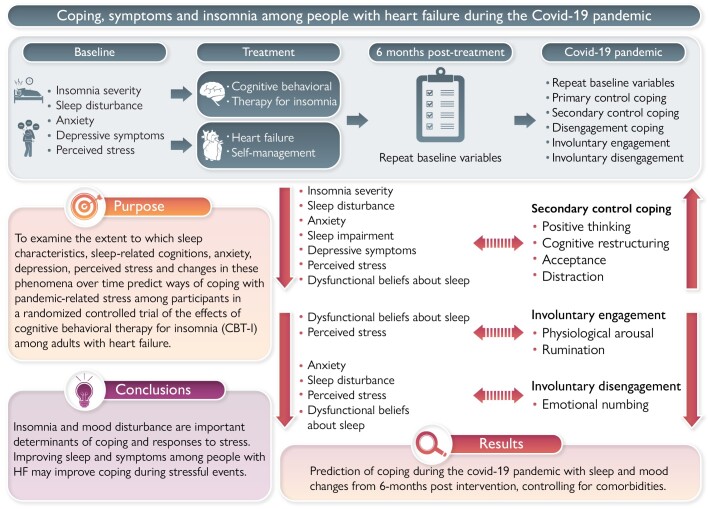Abstract
Aim
Increases in stress, symptoms of anxiety and depression and sleep problems have been reported during the Covid-19 pandemic, and people with chronic medical conditions such as heart failure (HF) are especially vulnerable. The purpose of this study was to examine the extent to which sleep characteristics, sleep-related cognitions, anxiety, depression, perceived stress, and changes in these phenomena over time predict ways of coping with pandemic-related stress among participants in the HeartSleep study, a randomized controlled trial of the effects of cognitive behavioral therapy for insomnia (CBT-I) in people with HF.
Methods
Participants completed questionnaires to elicit sleep characteristics, daytime symptoms, mood and stress at baseline, six-months after the intervention and during the Covid-19 pandemic. We added measures of coping during the pandemic (June-August 2020).
Results
The sample included 112 participants (M age = 63 ± 12.9 years; 47% women; 13% Black; 68% NY Heart Class II or III). Participants (43%) reported pandemic-related stressors and most often used secondary control coping. Insomnia severity, anxiety, depression, perceived stress, and sleep-related cognitions predicted secondary control coping (positive thinking, cognitive restructuring, acceptance, distraction), involuntary engagement (physiological arousal, rumination) and involuntary disengagement (emotional numbing).
Conclusions
Insomnia and mood disturbance are important determinants of coping and responses to stress. Improving sleep and symptoms among people with HF may improve coping during stressful events, and CBT-I may have protective effects.
Keywords: Covid-19, heart failure, insomnia, sleep, coping, stress, cognitive behavioral therapy
Graphical Abstract
Graphical Abstract.
Contributor Information
Meghan O’Connell, Yale School of Nursing, , 300 Heffernan Drive, West Haven, CT 06516, United States, Email: meghan.oconnell@uconn.edu.
Sangchoon Jeon, Yale School of Nursing, , 300 Heffernan Drive, West Haven, CT 06516, United States, Email: Sangchoon.jeon@yale.edu.
Samantha Conley, Yale School of Nursing, , 300 Heffernan Drive, West Haven, CT 06516, United States, Email: conley.samantha@mayo.edu.
Sarah Linsky, Yale School of Nursing, , 300 Heffernan Drive, West Haven, CT 06516, United States, Email: Sarah.linsky@yale.edu.
Nancy S Redeker, Yale School of Nursing, , 300 Heffernan Drive, West Haven, CT 06516, United States.
Supplementary Material
Associated Data
This section collects any data citations, data availability statements, or supplementary materials included in this article.



